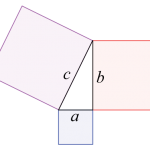 Occasionally I’m asked what arguments I have that prove that Christianity is true, as if there were a perfect argument for the Christian God so lucid in its rationality that the most hardened atheist could not help but accept it after a few moments’ perusal. (I exaggerate, but, I think, not by much.) The trouble is, there is no such argument for any proposition, of any kind, in any field. The closest we come is basic plane geometry, in the field of mathematics, where all reasonable people can come to agreement if they are willing to put the time in to understand the arguments. But as math progresses, the number of those willing and able to follow the proofs decreases; and math is a field where our human desires, preconceptions, prejudices, and fears rarely drive us toward one conclusion or another.
Occasionally I’m asked what arguments I have that prove that Christianity is true, as if there were a perfect argument for the Christian God so lucid in its rationality that the most hardened atheist could not help but accept it after a few moments’ perusal. (I exaggerate, but, I think, not by much.) The trouble is, there is no such argument for any proposition, of any kind, in any field. The closest we come is basic plane geometry, in the field of mathematics, where all reasonable people can come to agreement if they are willing to put the time in to understand the arguments. But as math progresses, the number of those willing and able to follow the proofs decreases; and math is a field where our human desires, preconceptions, prejudices, and fears rarely drive us toward one conclusion or another.
The field of philosophy is meant to reflect the best of human thought, working at its peak; but the famous inability of philosophers as a group to agree on much of anything is a reflection of both the limits of human reason and the human tendency to hang onto what one wants to believe. Theology adds the problems of revelation to the difficulties of philosophy, to such an extent that we are advised not to discuss religion in polite society.
On top of this, Christianity, although it emphasizes orthodoxy (that is, right speech about God), is not primarily a set of propositions to be held but rather is about a person to know, the person of Jesus Christ, who is God. Christianity is rational, I claim, but it is also experiential: our minds ascend to God in part because God descends to our level and speaks to us individually in a still, small voice.
In short, there is no magic bullet: no simple formula or straightforward argument I can present that will necessarily lead another to see the truth of Christian doctrine.
Nevertheless I assert that Christianity is rational: and that Catholic doctrine, in particular, is ultimately the best description of the nature of reality that we have. Note that I’m not discounting the sciences, for Catholic doctrine gives each its place. To study science, whether physics or chemistry or biology, is ultimately a deeply Catholic endeavor.
I’ll have more to say about the rationality of Christian belief in subsequent posts. My point in this post is simply to point out the futility of attempting to hold Christianity to a more onerous burden of proof than we accept as a matter of course in any other area of our lives.
____
By en:User:Wapcaplet [GFDLor CC-BY-SA-3.0], via Wikimedia Commons









